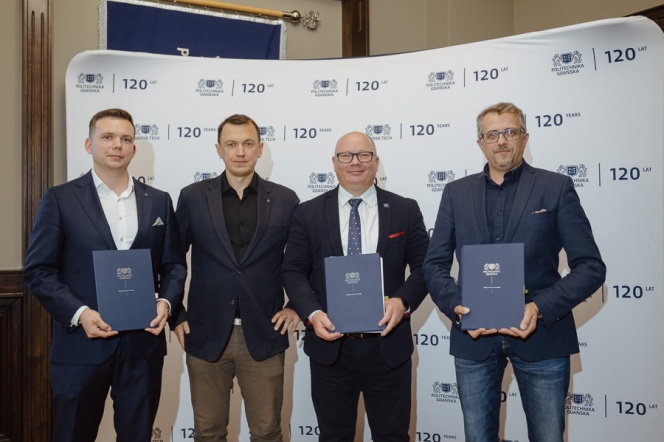Date added: 2024-07-08
NATO at Gdańsk Tech. The University is to become the Alliance's "Living Lab"

Launched by NATO in 2023, DIANA's main task is to bring together scientists and research teams working in start-up companies and on cutting-edge solutions in the field of so-called deep technology (deep tech) with civilian and defense units. The group consists of 32 countries of the Alliance, including Poland. The Polish Ministry of Defense's Innovation Department is the coordinator of the country's participation in the accelerator.
The result of the first months of the NATO DIANA program is the selection and acceleration of 44 of the world's best start-ups, including one from Poland - REVOBEAM, founded by researchers from the Gdańsk University of Technology. Over the past six months, these start-ups have developed innovative dual-use solutions in the areas identified by the program. Unfortunately, it is difficult to present these solutions to potential buyers within NATO on a permanent basis, and this is currently done in a limited way - for example, only during military training events.
“The use of NATO DIANA testing grounds has been on a temporary basis. When the testing concluded, the equipment had to be disassembled, which made it challenging to demonstrate the technology to a broader audience of civilian and defense customers. However, this is set to change, as the first Polish "Living Lab" of the DIANA program has become the campus of the Gdańsk University of Technology,” explains Łukasz Kulas, DSc. in engineering, a scientist at Gdańsk Tech and co-author of one of the solutions in the program, who initiated the creation of the "Living Lab" at the Gdańsk University of Technology.
First structures coming to Gdansk Tech campus in August
As a result of the NATO DIANA program, 21 of 44 solutions will soon be installed on the Gdansk Tech campus. These solutions will be primarily located outdoors, but also in laboratories and rooms that have been specifically prepared for them. Further installations are planned to be added in the future.
The University of Technology's "Living Lab" provides a platform for the establishment of long-term installations for technologies and structures that will benefit both the defense sector and civilian companies, such as those in the maritime industry. Each installation will be presented by qualified personnel and designed to reflect a realistic end-user scenario. All structures will be safeguarded on a round-the-clock basis and made available for viewing by prospective visitors from all NATO countries and Ukraine.
The first structures are expected to be constructed on the university campus as early as August of this year. The first agreement on the establishment of a "Living Lab" at Gdańsk Tech was signed on Thursday, 4th July 2024 by the authorities of Gdańsk University of Technology, represented by prof. Krzysztof Wilde, rector of the Gdańsk University of Technology, and the Polish Armament Group - Naval Shipyard (PGZ Stocznia Wojenna Ltd.), represented by Paweł Lulewicz, chairman of the company's board of directors.
“This agreement serves to reinforce the fact that Gdańsk University of Technology is a key partner of state authorities in Poland's defense and security sector,” said prof. Krzysztof Wilde, rector of Gdańsk Tech. “We are proud that Gdansk Tech is the host institution for the inaugural Polish "Living Lab" under the NATO DIANA program. This will enable swift evaluation and purchase of the best solutions from innovators in the DIANA program by the Polish Armed Forces and their counterparts from other NATO countries.”
NATO at Gdańsk Tech. What will be shown on campus?
A key focus area for the “Living Lab” at the Gdańsk University of Technology is the design of an autonomous drone boat. The boat will be employed to patrol and detect threats to offshore critical infrastructure, such as the offshore wind farms that are set to be built in the Polish Baltic Sea waters, among other activities. The boat's design will be based on the already created Hornet structure, developed by scientists from the Faculty of Electronics, Telecommunications and Informatics from the team led by Prof. Kulas.
“This project is a prime example of the synergy of knowledge, experience, and potential of the agreement's partners,” stated PGZ board chairman Pawel Lulewicz. “We look forward to showcasing the initial results of this cooperation at the International Defense Industry Exhibition in Kielce this September.”
In the course of developing the "Hornet" boat within the framework of international projects, Gdansk Tech created original solutions for enhancing situational awareness through the use of cameras and LIDARs, as well as reliable wireless communication technologies resistant to jamming attacks, as Prof. Kulas explains. "It is satisfying that our technologies, the result of many years of work, will soon be available to Polish companies," he adds.
As part of the ceremony on Thursday, Gdansk Tech, PGZ and the start-up REVOBEAM, created by Prof. Kulas and MSc. Mateusz Rzymowski (from the Faculty of Electronics, Telecommunications and Informatics at Gdańsk Tech) to commercialize the smart antennas developed at the university, signed a cooperation agreement to further develop the project. Cree Yacht and Mobile Monitoring also feature as partners of the project.
What else will be showcased in the “Living Lab” of the NATO DIANA program at Gdańsk Tech?
These will include, among others, miniature scalable fuel cells, an autonomous underwater drone, drone identification systems, mobile devices for harvesting energy from the wind or sea waves, systems for increasing the resilience of critical infrastructure to cyber-attacks, devices for long-distance laser-link communications, sensor systems for perimeter protection, devices that allow land vehicles to navigate in the event of GPS jamming, and communication systems for drones resistant to intentional communications jamming.
-
2026-01-12
Turning seawater into green fuel

